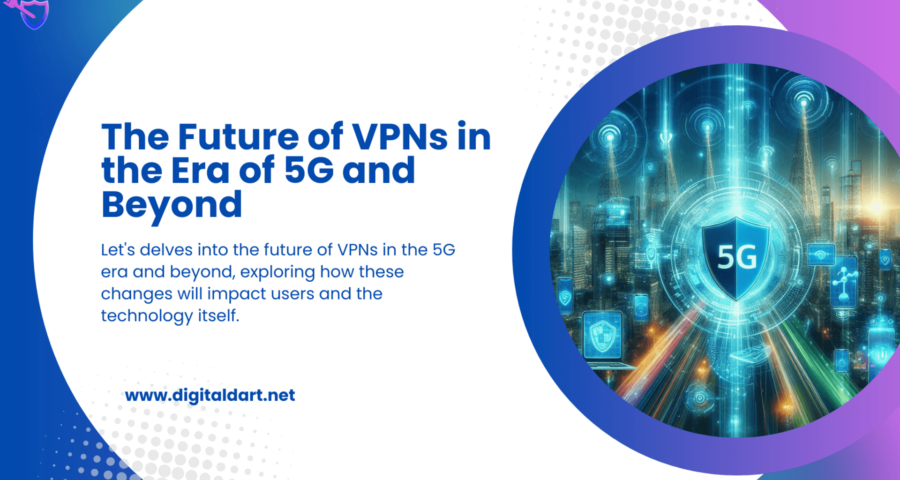As we transition into an era dominated by 5G technology, the landscape of internet connectivity is poised for a monumental shift. VPNs (Virtual Private Networks), long regarded as essential tools for maintaining online privacy and security, are set to undergo significant transformations to keep pace with the advancements brought by 5G. This article delves into the future of VPNs in the 5G era and beyond, exploring how these changes will impact users and the technology itself.
Understanding 5G Technology
What is 5G?
5G, the fifth generation of mobile network technology, promises to revolutionize the way we connect to the internet. Key features of 5G include:
- Higher Speeds: 5G networks are expected to be up to 100 times faster than 4G, enabling lightning-fast downloads and uploads.
- Lower Latency: Reduced latency means that data transmission delays are minimized, which is crucial for real-time applications like online gaming and video conferencing.
- Increased Connectivity: 5G can support a massive number of connected devices per square kilometer, making it ideal for the Internet of Things (IoT) and smart city applications.
The Impact of 5G on Internet Usage
The advent of 5G will significantly enhance the mobile experience. Users can expect faster browsing and improved streaming quality. Moreover, 5G will play a pivotal role in the development of IoT and smart cities by ensuring seamless connectivity among a vast array of smart devices.
The Evolution of VPN Technology
Current State of VPNs
Traditional VPNs have served as reliable tools for maintaining online privacy and security. They function by encrypting data and routing it through secure servers, masking users’ IP addresses and protecting their online activities from prying eyes.
However, traditional VPNs come with certain limitations:
- Speed Reduction: VPNs often slow down internet speeds due to the encryption process and server routing.
- Compatibility Issues: Some VPNs may not work well with certain networks or devices, limiting their usability.
Emerging Trends in VPN Technology
To address these limitations, VPN technology is evolving. Next-generation VPNs are incorporating advanced encryption methods and improved speed and performance. Integration with new technologies, such as artificial intelligence (AI) and quantum encryption, is also on the horizon, enhancing security and future-proofing VPNs.
The Future of VPNs in the 5G Era
How 5G Will Enhance VPN Performance
The introduction of 5G is expected to enhance VPN performance in several ways:
- Speed and Efficiency: With the higher speeds offered by 5G, the impact of VPN-induced speed reduction will be minimized, resulting in a smoother user experience.
- Lower Latency: Reduced latency will benefit real-time applications, allowing for lag-free gaming and streaming even when using a VPN.
Potential Challenges and Solutions
Despite the benefits, 5G also presents challenges:
- Security Concerns: The increased connectivity of 5G could lead to heightened cyber threats. Advanced encryption and AI-driven threat detection are essential solutions to mitigate these risks.
- Infrastructure and Compatibility: Ensuring compatibility with various 5G networks may require standardization efforts and adaptive VPN protocols.
Beyond 5G: The Future Landscape
6G and Beyond
Looking further ahead, 6G technology is expected to bring even higher speeds and ubiquitous connectivity. The implications for VPN technology are significant, with advancements in encryption and seamless integration with evolving technologies anticipated.
Emerging Technologies and Their Impact on VPNs
- Quantum Computing: While quantum computing poses a threat to traditional encryption methods, the development of quantum-resistant VPNs will ensure data remains secure.
- Artificial Intelligence: AI-driven security enhancements and predictive threat analysis will become increasingly important in the development of future VPNs.
Practical Applications and Case Studies
Real-World Examples
Businesses are already adapting to 5G with advanced VPN solutions. For instance, companies implementing next-generation VPNs have reported significant benefits in terms of speed and security. On the consumer side, individuals are experiencing enhanced online privacy and improved streaming and gaming experiences.
Tips for Choosing a Future-Proof VPN
When selecting a VPN for the future, consider the following key features:
- High-Speed Performance: Look for VPNs that offer minimal impact on speed.
- Advanced Encryption Methods: Ensure the VPN uses state-of-the-art encryption to protect your data.
Some leading VPN providers that are adapting to 5G and beyond include [Provider A], [Provider B], and [Provider C].
Conclusion
The future of VPNs in the era of 5G and beyond is promising. With advancements in speed, security, and compatibility, VPNs will continue to be indispensable tools for maintaining online privacy and security. As we move towards 6G and other emerging technologies, the evolution of VPNs will ensure they remain effective in protecting our digital lives.
To stay ahead of the curve and ensure your online activities are secure, consider using a VPN service from Digital Dart. Our cutting-edge VPN solutions are designed to provide maximum security and performance in the rapidly evolving digital landscape. Sign up today and experience the future of VPN technology firsthand.


Leave a Reply